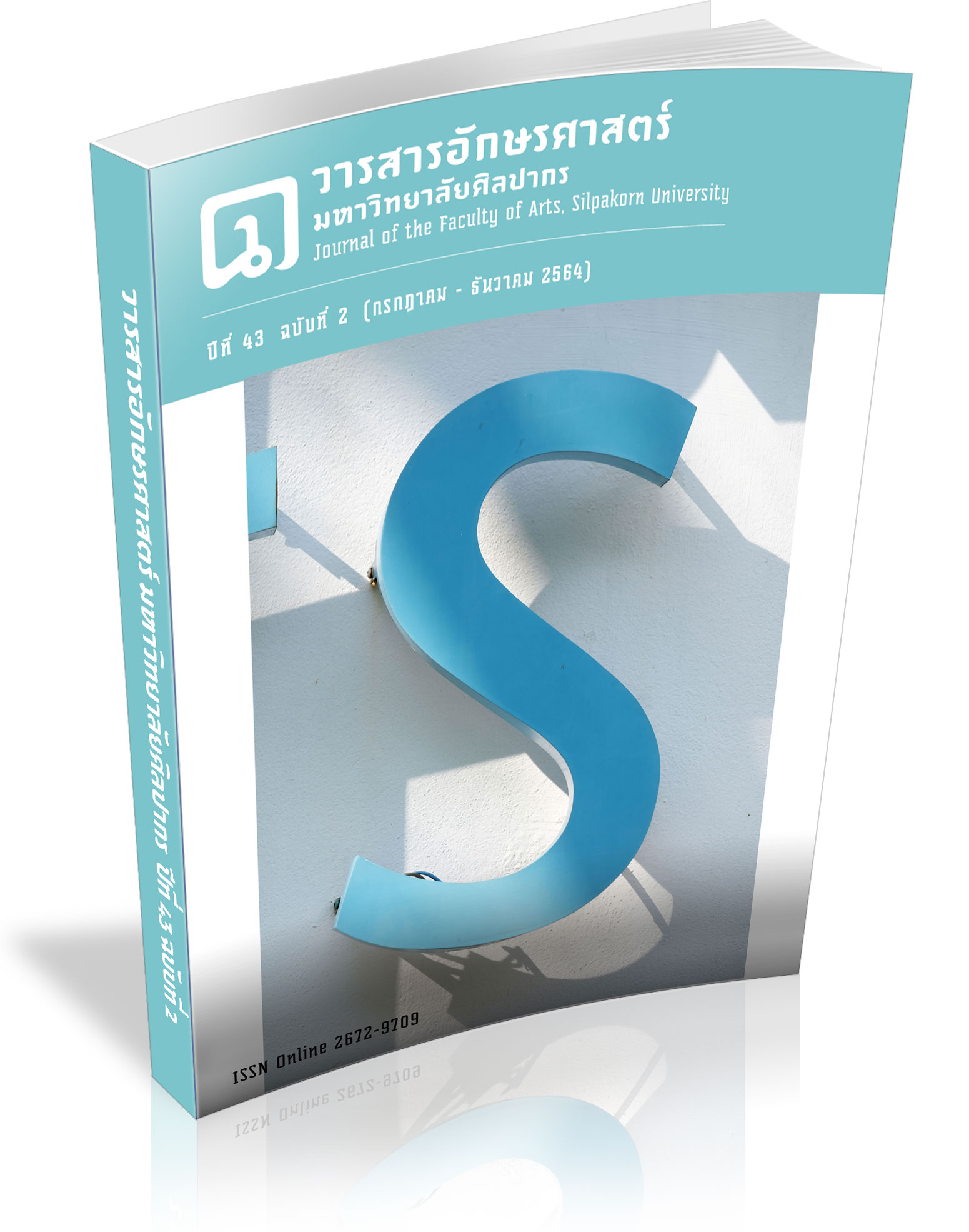Linguistic Strategies and Motivational Concerns for Giving Advice in Thai
A Study of Emancipatory Pragmatics
Keywords:
Linguistic strategies, Motivational concerns, Giving advice, Emancipatory PragmaticsAbstract
The objective of this research is to study the linguistic strategies used and motivational concerns of giving advice in Thai by using emancipatory pragmatics. Data was collected from 200 respondents via questionnaire, to which 20 were randomly selected for further in-depth interviews. The research results reveal that there are four major linguistic strategies used for giving advice in Thai: 1) to relieve listeners; 2) to express relationships; 3) to give straightforward advice; and 4) to get listeners to agree with the advice. Regarding the motivational concerns when giving advice in Thai, this study shows that the speakers are genuinely concerned with the feelings of the listeners. This reflects that advice in the context of Thai society and culture is given as a non-coercive act of speech avoiding listeners to lose face by way of extending good wishes to them.
Downloads
References
Brown, P. & Levinson, S. C. (1987). Politeness: Some Universals in Language Usage. Great Britain: Cambridge University Press.
Bunyanate, N. (1992). Family. in Satha-anand, S. & Bunyanate, N., Eds. Word: Trace of Thai Beliefs. Bangkok: Chulalongkorn University, Research Division, Faculty of Arts’ Publication Project, Thailand. (In Thai)
Dolphen, I. (2001). A Study of Giving Advices in Thai. Master Thesis, Thai Language, Chulalongkorn University, Thailand. (In Thai)
Gudykunst W. B & Ting-T. S. (1988). Culture and Interpersonal Communication. Michigan: Sage Publications.
Hanks, W. F., Ide, S. & Katagiri, Y. (2009). Introduction: Towards An Emancipatory Pragmatics. Journal of Pragmatics, 41(1), 1-9.
Hofstede, G. (1984). Culture’s Consequences: International Differences in WorkRelated Values. Beverly Hills: Sage Pub.
Hongladarom, K. (2009). Indexicality in Thai and in Tibetan: Implications for A Buddhism Grounded Approach. Journal of Pragmatics, 41(1), 47-59.
Hongladarom, K. & Chauksuvanit. (2008). Pragmatics. Bangkok: Chulalongkorn University, Faculty of Arts’ Publication Project, Thailand. (In Thai)
Ide, S. (1982). Japanese Sociolinguistics: Politeness and Women’s Language. Lingua, 57(2-4), 357-385.
_________. (1989). Formal Forms and Discernment: Two Neglected Aspects of Universals of Linguistic Politeness. Multilingua, 8, 223-248. cited Fukushima, S. (2003). Requests and Culture: Politeness in British English and Japanese. New York: Peter Lang.
Phakdeephasook, S. (2018). A Relationship between Language and Identity, and Method of Studying Thai. Bangkok: Chulalongkorn University, Faculty of Arts’ Publication Project. (In Thai)
Pothisita, C. (1992). Partisan. in Satha-anand, S. & Bunyanate, N., Eds. Word: Trace of Thai Beliefs. Bangkok: Chulalongkorn University, Research Division, Faculty of Arts’ Publication Project, Thailand. (In Thai)
Rabibhadana, A. (2010). Look at Society through Life in The Community. Bangkok: Princess Maha Chakri Sirindhorn Anthropology Centre (Public Organisation). (In Thai)
Royal Institute. (2013). Royal Institute Dictionary. Bangkok: Nanmeebooks. (In Thai)
Searle, J. R. (1976.) The Classification of Illocutionary Acts. Language in Society, 5, 1-24.
Sompopcharoen, M. (2013). Theories of Interpersonal Communication. Nonthaburi: SongKhacreation. (In Thai)
Sukprasert, P. (2009). Strategies and Discourse Structure of Advice Giving in Thai. Master Thesis, Linguistics, Chulalongkorn University, Thailand. (In Thai)
Triandis, H. C. (1995). Individualism & Collectivism. Boulder: Westview Press.
Tussanaboon, P. (2019). KHWAAMAAWUSOH or Seniority and Linguistic Strategies in The Speech Acts of Disagreeing, Complaining, and Advicing in Thai. Master Thesis, Thai Language, Thammasat University, Thailand. (In Thai)
Verschueren, J. (2011). IPrA, the International Pragmatics Association, at 25. Retrieved 3 March 2020, from https://semioticon.com/semiotix/2011/10/ipra-the-international-pragmatics-associationat-25
Wichiarajote, W. (1973). The Theory of Affiliative Society. Mimeograph. cited Komin, S. (1991). Psychology of The Thai People: Values and Behavioral Patterns. Bangkok: Research Center, National Institute of Development Administration (NIDA).
Yaowarittha, C. (2012). The Concept of "Bunkhun" and Three Types of Speech Acts in Thai Society. Master Thesis, Thai Language, Chulalongkorn University, Thailand. (In Thai)
_______. (2015). The Speech Act of Students’ Complains to Their Parents and Factors Contributing to Their Complains. Research Report, Thai Language, Bansomdejchaopraya Rajabhat University, Thailand. (In Thai)
Downloads
Published
How to Cite
Issue
Section
License
Copyright (c) 2021 Journal of the Faculty of Arts, Silpakorn University

This work is licensed under a Creative Commons Attribution-NonCommercial-NoDerivatives 4.0 International License.
ผู้เขียนบทความต้องยินยอมในข้อกำหนดต่าง ๆ ของวารสารก่อนส่งบทความตีพิมพ์



